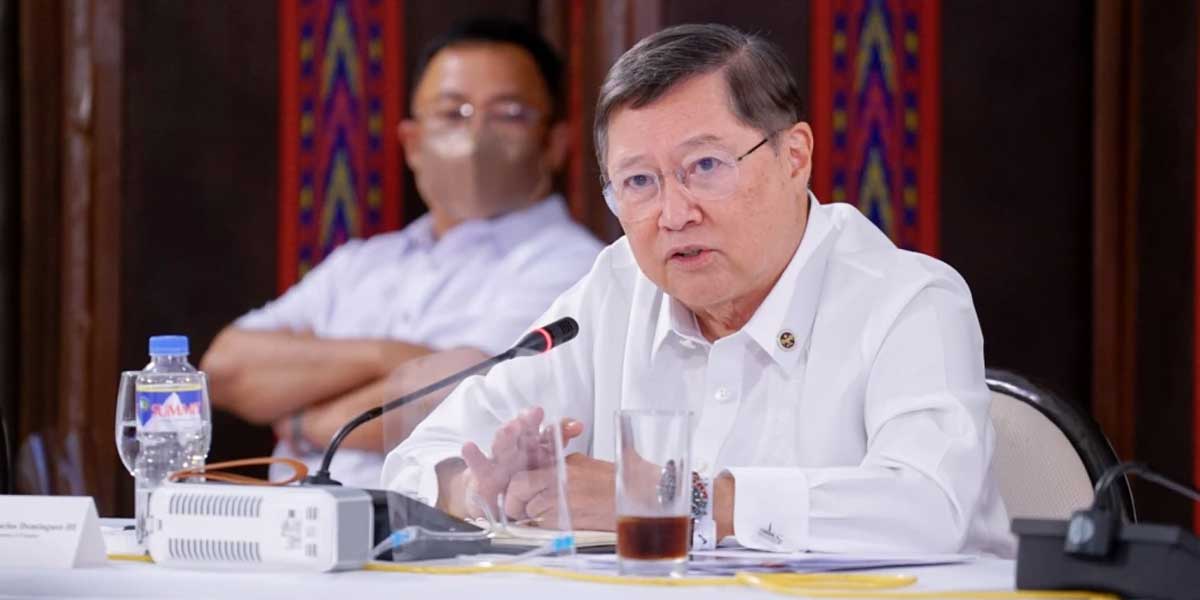
Department of Finance (DOF) Secretary Carlos Dominguez III has called on tax management professionals to help build trust among taxpayers and encourage them to pay the right amount of taxes instead of finding “loopholes” for their clients to get away with tax evasion and avoidance.
Dominguez said that although the government was able surpass its 2021 revenue targets, with collections last year 9 percent higher than in 2020, the numbers show that the effective tax rate for the value-added tax (VAT) remains at 5 percent against the legal rate of 12 percent.
The effective rate for the corporate income tax (CIT) before the Corporate Recovery and Tax Incentives for Enterprises (CREATE) Law took effect last year stood at only 9 percent against the legal rate of 30 percent, Dominguez also noted.
Dominguez traced such “yawning discrepancies” between the actual legal rate and the effective tax rate to the practice of tax evasion and avoidance resulting from expert “tax management” by professionals for their taxpayer-clients.
While these “tax management” practices might serve to improve the profit margins of taxpayers, such schemes prevent the government from collecting enough to invest in productive projects, he said.
“Had the government been able to collect all taxes due, we would have had more funds to cover our economic investments, debt service, and COVID-19 response expenditures. We would have borrowed less. The government would have been better able to invest in building the prosperous future our people deserve,” he told members of the Tax Management Association of Philippines (TMAP) on Thursday afternoon during the organization’s induction and inaugural general membership meeting for 2022.
“In sum, the government needs all the revenues it can get to meet the challenges of the time,” he said.
“I, therefore, urge the TMAP to help the government fill in this revenue gap and not widen it further. Tax management should mean raising funds sufficient to allow investment in public goods,” Dominguez added.
Dominguez pointed out that for “some professionals, tax management means finding the loopholes and uncovering the means for tax avoidance. This is probably the more lucrative side of your profession. But it is not the most patriotic.”
He reminded TMAP that better infrastructure, peace and order, rule of law and good governance attract more investments than fiscal incentives as these public goods make conditions better in the long run for businesses to thrive.
In this difficult time, Dominguez said “there is virtue in putting patriotism first,” to help build a better and stronger economy for Filipinos.
Dominguez, at the same time, commended TMAP for its work “in engaging our taxpayers and supporting the modernization of our tax policies.”
“Without your help, we would not have been able to achieve even half of what this administration has done,” Dominguez said.
With the support of organizations like TMAP, Dominguez said the Duterte administration was able to help create a better environment for doing business in the country through its investor-friendly initiatives, such as the passage of the CREATE Law, Ease of Doing Business (EODB) Act, infrastructure modernization and the national ID system, among other reforms.
The recent signing into law of the much-awaited amendments to the Retail Trade Liberalization Act (RTLA), the expected enactment of the new Foreign Investment Act (FIA) and the more liberal Public Services Act (PSA), are among the other reforms put in place under the Duterte administration to provide a more business-friendly climate for investors, Dominguez said.
He also cited the implementation of climate actions on the ground and the Philippines’ demand for climate justice before the international community along with its ongoing pandemic response measures to ensure the country’s resilience against future threats.
“We have been very active in implementing climate change actions on the ground and have demanded climate justice on the international scene,” said Dominguez, who is the official representative of the President to the Climate Change Commission (CCC).
He said that, “In the time of pandemic, the government has done all it could to protect our people, provide for vaccines and relief, and ensure future resiliency to threats against mankind, man-made or not. Perhaps the TMAP should do its own part.”
“As the economy recovers from the setbacks caused by the pandemic, we need to continuously strengthen our public health system not only to contain the present contagion but to fight and prepare for future outbreaks,” he said. “We need to invest more in infrastructure and human capital development projects. The rehabilitation of communities devastated by extreme weather events will impose added costs to the government. We have to spend more to make our communities more resilient to climate change.”
This must-do list requires additional revenues, which TMAP can help the government raise by inculcating in the companies that its members represent “their duty to contribute to the cause of creating a more comfortable life for the Filipino people,” Dominguez said.
“Our experts in tax management should encourage our businesses to pay the right taxes and keep with the intent of our tax laws, instead of spending so much intellectual energy in finding every loophole there is,” Dominguez said.
“We, therefore, call on you to step up and help build taxpayers’ trust; provide revenues for our socio-economic programs; invest in technology; innovate your processes; and focus on protecting the environment,” he said.




















